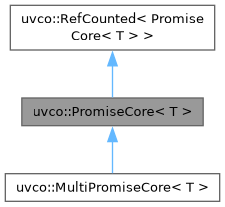#include <promise_core.h>

Public Member Functions | |
| PromiseCore ()=default | |
| PromiseCore (const PromiseCore &)=delete | |
| PromiseCore (PromiseCore &&)=delete | |
| PromiseCore & | operator= (const PromiseCore &)=delete |
| PromiseCore & | operator= (PromiseCore &&)=delete |
| virtual | ~PromiseCore ()=default |
| PromiseCore (T &&value) | |
| virtual void | setHandle (std::coroutine_handle<> handle) |
| Set the coroutine to be resumed once a result is ready. | |
| void | setRunning (std::coroutine_handle<> handle) |
| Used by Coroutine<T> to set the producing coroutine handle. | |
| void | resetHandle () |
| bool | isAwaited () |
| Checks if a coroutine is waiting on a promise belonging to this core. | |
| bool | ready () const |
| Checks if a value is present in the slot. | |
| bool | stale () const |
| void | resume () |
| void | destroyCoroutine () |
| void | except (const std::exception_ptr &exc) |
Public Attributes | |
| std::optional< std::variant< T, std::exception_ptr > > | slot |
| The slot contains the result once obtained. | |
Protected Attributes | |
| std::coroutine_handle | coroutine_ |
| std::coroutine_handle | waitingHandle_ |
| PromiseState | state_ = PromiseState::init |
Detailed Description
class uvco::PromiseCore< T >
A PromiseCore is part of the Coroutine<T> frame; a reference to it is held by the Promise referring to the coroutine.
Constructor & Destructor Documentation
◆ PromiseCore() [1/4]
|
default |
◆ PromiseCore() [2/4]
|
delete |
◆ PromiseCore() [3/4]
|
delete |
◆ ~PromiseCore()
|
virtualdefault |
◆ PromiseCore() [4/4]
|
inlineexplicit |
Member Function Documentation
◆ destroyCoroutine()
|
inline |
◆ except()
|
inline |
◆ isAwaited()
|
inline |
Checks if a coroutine is waiting on a promise belonging to this core.
◆ operator=() [1/2]
|
delete |
◆ operator=() [2/2]
|
delete |
◆ ready()
|
inlinenodiscard |
Checks if a value is present in the slot.
◆ resetHandle()
|
inline |
Reset the handle, so that the coroutine is not resumed anymore. This is required for SelectSet.
◆ resume()
|
inline |
Resume a suspended coroutine waiting on the associated coroutine by enqueuing it in the global event loop.
A promise core can only be resumed once.
◆ setHandle()
|
inlinevirtual |
Set the coroutine to be resumed once a result is ready.
Reimplemented in uvco::MultiPromiseCore< T >.
◆ setRunning()
|
inline |
Used by Coroutine<T> to set the producing coroutine handle.
◆ stale()
|
inlinenodiscard |
Returns true if the promise has completed, and its results have been fetched.
Member Data Documentation
◆ coroutine_
|
protected |
Set to the coroutine producing this promise. Used to destroy it after completion or when the associated Promise is dropped.
◆ slot
| std::optional<std::variant<T, std::exception_ptr> > uvco::PromiseCore< T >::slot |
The slot contains the result once obtained.
◆ state_
|
protected |
◆ waitingHandle_
|
protected |
Set to the coroutine awaiting this promise if state_ == awaitedOn. May be nullptr.
The documentation for this class was generated from the following files:
- uvco/promise/promise_core.h
- uvco/promise/promise_core.cc
Generated by